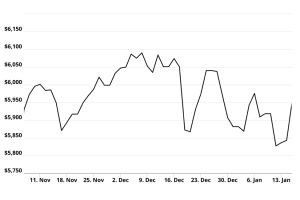
Hello, Reader.
Imagine yourself playing cards at a casino. You’re in the middle of a Texas Hold’em cash game, and the round has come down to just two people: you and a swashbuckling player who’s been harassing everyone else all night.
Your opponent goes all in, revealing the two kings in his hand. He pushes $200 into the middle of the table, increasing the pot to $2,000.
You gulp. The communal cards read J-Q-K-5, which means he has a three-of-a-kind. (In this version of poker, he can combine his two kings with the third communal king to make a strong final hand.)
The bottom line here is that card playing is complex. The best professional poker players aren’t just playing the mathematical odds… they’re watching what everyone else is doing and using those observations to adjust their views. It’s why you’ll see top poker players watching other people at the table, and how many seem to “know” what’s in everyone’s hands.
The same is true for global macroeconomic investing.
Instead, the key to global macro investing is to observe and integrate all the known data points… not just one of them… and to make logical, high-probability inferences from them. It can sometimes be a complex dance that requires both an eye for detail, and a seasoned ability to connect those details into an investible thesis.
Let’s take a look at how this works in practice, using an analysis from someone you all know: InvestorPlace Markets Analyst Thomas Yeung.
In a recent Fry’s Investment Report weekly update, Tom asked: “Do commodities have a China problem?”
Several Chinese groups had released mixed economic data, and the “mathematical” odds suggested that the commodity world was heading for a bear market. After all, Tom noted, China takes in over half of global copper exports and two-thirds of soybeans.
However, Tom said that this simplistic supply-demand view neglected potential interventions of the Chinese central government. These are the unexpected “raises” and “bluffs” that the world stage’s highest-rolling “poker players” can use to influence, well, everything. He wrote…
UBS cut its 2024 Chinese GDP growth target to 4.6% this week, down from earlier forecasts of 4.9%…
That means more fiscal stimulus is probably on the way. We expect the Chinese government to focus on the real estate sector, given cooling in prices and better fiscal restraint by large developers. The central government had previously announced GDP growth targets of “around” 5%, and the slowing housing markets will make it the most tempting lever to pull.
Recently, the Chinese government did precisely that. Not only did the Chinese central bank cut interest rates… but it also explicitly took steps to reduce the cost of existing mortgages. The bank said it would save 50 million households about $21 billion a year. These actions were partially made possible by last month’s Federal Reserve key interest rate cut, which allowed the Chinese government to add expansionary policies without causing a currency slump.
It’s also caused a renewed surge in commodity prices, particularly those related to the construction industry. Prices of copper and aluminum are up anywhere from 3% to 10% since September.
In other words, Tom read China’s hand correctly. Good for him!
And even better for my Fry’s Investment Report commodity bets. In fact, one of my copper producer plays – a company that has also been testing AI – is up 22% in September. And since I first recommended this company back in 2020, it is up nearly a whopping 300%!
The bottom line is that I continue to have an upbeat outlook on commodity stocks. To learn more about the companies I recommend at Fry’s Investment Report, you can click here learn more about becoming a member.
Now, let’s look at what we covered here at Smart Money this past week…
Smart Money Roundup
Our “Leaders” Aren’t Talking About AGI, but We Have To

Artificial intelligence was not on the minds of the presidential and vice-presidential candidates, or any of the moderators in the few debates we’ve seen. Yet, it’s all anyone seems to be talking about in the real world. The arrival of Artificial General Intelligence (AGI) is imminent, and it’s crucial to stay informed. Click here to learn more, and to find out the opportunities AGI creates.
The “Expedia” of Self-Driving Cars… and an Even Bigger AV Bet

In 1994, 27-year-old Microsoft product manager Rich Barton pitched a game-changing idea to Bill Gates and other executives: What if you could take travel booking… and move it online? Thus, Expedia was born. Soon, the same truth will emerge in the autonomous vehicle (AV) world. And now that Telsa is widely expected to join the AV space, there’s one company that stands to benefit. Continue reading here.
The One Way to Get in on Elon Musk’s Robotaxi Before Its 10/10 Debut

The Age of Autonomous Vehicles has arrived. In Saturday’s guest issue from Luke Lango, he writes about his firsthand experience using Waymo, the self-driving unit at Alphabet. The company is firing on all cylinders, but it isn’t the only one defining this eventual reality. Self-driving cars are spreading rapidly, and huge investment opportunities should emerge out of all that change. Click here to read more.
The Two Types of Self-Driving Tech Every Investor Should Know About

Before the “Age of Avs” potentially creates a massive payday, it’s important to know how these vehicles actually work to understand the burgeoning megatrend. At its core, there’s a combination of sensors: the “hardware stack” and the AI-powered “software stack.” Together, these allow cars to make informed decisions. For more detail on the roles of these software and hardware stacks, click here.
Looking Forward
Over the past week, we’ve talked a good deal about autonomous vehicles here at Smart Money.
That’s because on Thursday, Elon Musk is set to reveal his robotaxi to the entire world at Tesla’s “We, Robot” event. It’s a fully automated Cybercab with no mirrors, no pedals, and no steering wheel.
And my colleague, tech legend Luke Lango, believes it could send shares of a little-known supplier up to 20X higher. Click here for more details in this full video report.
Plus, we will continue to dive into this topic here throughout this week… and share ways you can profit on it.
Regards,
Eric Fry
Editor, Smart Money




